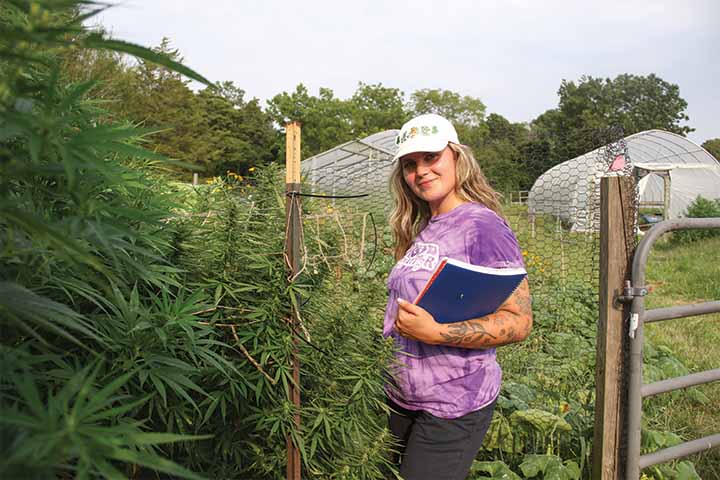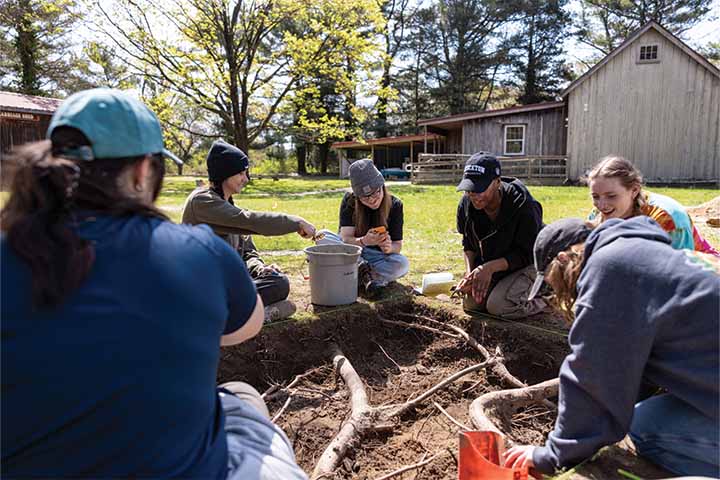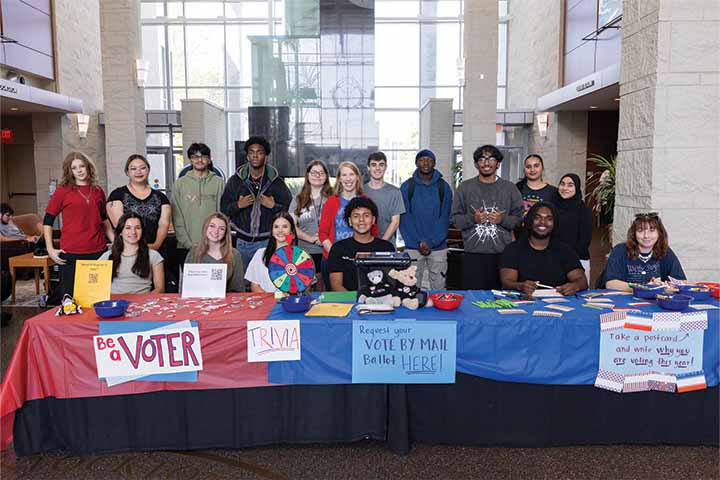Academic Innovation

Academic Innovation
Stockton offers more than 160 areas of study across majors, minors and certificates. The University continues to adapt and grow degree programs to fit the needs of students and the region.
Stockton First in N.J. to Offer Cannabis Undergraduate Degree
Launched in fall 2024, Stockton University became the first college or university in New Jersey to offer an undergraduate degree in cannabis studies.
The Bachelor of Science in Hemp and Cannabis Business Management through Stockton’s School of Business will prepare students to join a booming industry that has seen a 66% increase in the number of jobs in New Jersey, according to Stockton then-Adjunct Professor Rob Mejia.
“This year, New Jersey is on track to sell over $1 billion of cannabis products,” said Mejia. “You have to pay attention to a $1 billion business. Cannabis and hemp being so unique and regulated, you have to have special skills in order to get involved and be successful in the industry.”
In March 2023, the number of cannabis- and hemp-related jobs in New Jersey was about 7,400, according to Vangst, the cannabis industry’s No. 1 job platform. That number jumped to about 12,200 in March 2024 and continues to grow as the state opens new licensing classes in distribution, wholesaling and delivery.

Mejia added that New Jersey’s edible cannabis business — including infused chocolate, beverages and snacks — has just begun to expand, which will lead to an increase in job demand.
“It’s clearly an industry that is growing exponentially, and as a result, there are job opportunities that have surfaced, both directly within the industry as well as with ancillary jobs,” said Warren Kleinsmith, the then-dean of the School of Business. “It’s an opportunity for students to capture much needed talent in a booming industry.”
In addition to courses that focus on cannabis cultivation, social justice and cannabis and introduction to medical cannabis, the degree’s core is grounded in strong business classes, such as business policy and strategies, marketing principles and macroeconomics. The degree also builds on Stockton’s existing Cannabis Studies minor, which was introduced in 2018 and has more than 70 graduates.
School of Business Announces New Entrepreneurship, Accounting Degrees
Stockton University continues to adapt to an ever-changing business world by announcing two new degree programs starting with the spring 2025 semester — a Bachelor of Science in Entrepreneurship and a Master of Science in Accounting.

The new programs highlight how the University’s School of Business embraces emerging industries and prepares students for future career opportunities. Entrepreneurship will also be available as a new minor to students.
“The Bachelor of Science in Entrepreneurship will allow students to focus on business development, startups and innovation," said Warren Kleinsmith, then-dean of the School of Business. “While the Master of Science in Accounting offers flexibility and real-world experience to students looking to further their education.”
The Entrepreneurship program’s comprehensive curriculum covers essential topics such as commercialization, business planning, marketing strategies, global entrepreneurship, innovation and leadership. Students will engage in real-world projects that allow them to apply classroom knowledge to practical situations.
“To have a job is good; to create jobs changes the community,” said Assistant Professor of Business Management Monica Amadio, who’s also the chair of the Entrepreneurship Task Force. “Entrepreneurship drives economic growth and fosters innovation. The minor will also benefit students in other programs at Stockton who want to be business owners or have an entrepreneurial mindset.”
The new Master of Science in Accounting degree is the third graduate-level program offered by the School of Business.
The new Accounting program is distinctive from other area institutions for many reasons, including a professional work experience and internship requirement, an alignment with the CPA licensure, two concentrations in forensic accounting and business analytics, and accreditation through the Association to Advance Collegiate Schools of Business, said Carla Cabarle, associate professor of Accounting and the chair of the program.
“The Accounting Program’s mission is to launch students’ careers through active learning and professional networks and to produce profession-ready graduates that are empowered with passion, knowledge, skills, values and engaging perspectives to develop as competitive leaders,” Cabarle said.
Criminal Justice Program Becomes Bachelor of Science
Stockton University has changed some of the requirements of its undergraduate Criminal Justice degree program to meet the evolving needs of the field.
Effective for incoming students in fall 2025, Stockton will offer a Bachelor of Science in Criminal Justice. Current students will earn a Bachelor of Arts in the major.
Marissa Levy, the dean of the School of Social and Behavioral Sciences, said one of the main reasons for the switch is to better prepare students for jobs in the Criminal Justice field.
“The expanded curriculum that the B.S. degree offers allows Stockton’s program to not only remain competitive with other programs in the region, but it also provides the curricular latitude for students to graduate with skills and knowledge valued by employers and the communities they serve,” she said.
Levy added the changes come after several years of discussion among faculty regarding how social justice movements in the United States have changed the field. Now, students will not only gain knowledge in the core components of the Criminal Justice system itself (Courts, Policing and Corrections), but they’ll also learn about the related areas of Victimology, Psychology and Sociology, Levy said.
The new curriculum also provides students with in-depth knowledge related to contemporary issues in today’s criminal justice system, such as how race and other vulnerable, minority populations directly interact with the system and its policies and practices.
Hands-on Research a Focal Point of New Archaeology Minor
When Andreya Rusnak first heard about Stockton University’s new Archaeology minor, she didn’t think it would interest her, even though she’s always loved history.

“When I think of an archaeologist, I always think of someone who digs up dinosaur bones,” said the sophomore from Vineland. “But when Dr. Hornbeck explained it to me, she talked about how it’s actually the study of cultures of the past.”
That’s exactly what Bobbi Hornbeck, assistant professor of Archaeology and the creator of the new minor, wants to hear.
“There’s not enough awareness of the fact that Archaeology is applicable to so many different disciplines and jobs,” she said. “It literally is appropriate for anybody.”
That is, anybody who has an interest in the scientific study of the material culture left behind by humans in the past.
Hornbeck said Stockton’s Archaeology minor is unique among schools in New Jersey because of its tailored structure. Students must choose a focus — general archaeology, classics, geoarchaeology or zooarchaeology, which involves biology. These subjects echo the real-world demands of the field and can lead to jobs in research science, protecting or preserving heritage sites or museum curation.
“People can’t agree on whether Archaeology is history, a social science or an environmental science because it doesn’t actually fit into one box,” Hornbeck said. “You have incorporate all of it to actually answer questions about humanity and what it means to be human.”
Junior Justin Popdan is not as interested in what’s under the ground, but what’s under the sea. Growing up in the “seafaring town” of Cape May, he wants to mix his love of Marine Science and shipwrecks with Archeology.
“The normal anthropology side of finding bones or looking at ancient civilizations is cool to me, but I like the ocean aspect, specifically because of how unexplored it is. So much has gone missing at sea that’s just so untouched,” he said.
The potential of finding pirate treasure is kind of cool, too.
New Public Policy Certificate Prepped for Fall 2025
A new Public Policy Certificate offered by the School of Social & Behavioral Sciences starting this fall will capitalize interdisciplinary teaching by offering undergraduate students an opportunity to become better advocates for societal change.
“Public policy is spread all across the University in smaller pockets already,” said Tina Zappile, associate professor of Political Science and the faculty director of the William J. Hughes Center for Public Policy. “We have students majoring in Environmental Studies, Sustainability, Economics and Political Science doing concentrations in Public Policy. This is about bringing all that together to offer a standalone, interdisciplinary certificate that any undergraduate student can add.”
Zappile defines public policy as the study of rules, regulations and laws established by government. However, that can also include regulatory agencies creating standards that protect the environment, defining educational guidelines or designing infrastructure plans for society as a whole.

“It’s anything that regulates or tells people how to organize,” she said. “Basically, the rules for how we live.”
And that’s important for students because public policy decisions can have a lasting impact on current and future generations, said Lauren Balasco, associate professor of Political Science.
“Whether it’s through tax laws, environmental initiatives, social welfare programs, or public infrastructure projects, public policy determines who has access to essential services and opportunities,” said Balasco, who’s one of the leaders of the new certificate.
“By studying these policies, Stockton students can evaluate whether resources are being distributed fairly, whether policies are helping to reduce inequality, and whether they are creating conditions for people to lead safe and fulfilling lives.”



